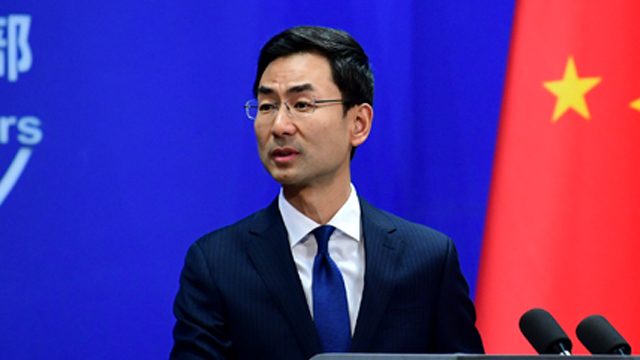SUMMARY
This is AI generated summarization, which may have errors. For context, always refer to the full article.

MANILA, Philippines – Following concern from Philippine experts and lawmakers, China dismissed fears over reports alleging the Chinese government could control Philippine power supply through a state-owned company’s stake the National Grid Corporation of the Philippines (NGCP).
“The allegation of China’s control over the Philippines’ power grid or threat to the country’s national security is completely groundless,” Chinese Foreign Ministry Spokesperson Geng Shuang said in a regular press briefing in Beijing on Wednesday, November 27.
“We hope certain individuals in the Philippines will look at cooperation with China in an open, objective and impartial manner. There is no need to worry about the sky falling or imagine trouble where there is none,” Geng added.
Geng issued the comment after Philippine officials such as opposition Senator Risa Hontiveros and Senate Energy Committee chair Sherwin Gatchalian said the Senate would probe the potential threat of China shutting off the country’s electricity supply. (READ: China control of NGCP ’cause for concern’ – Carpio)
Manila and Beijing have rival claims in the West Philippine Sea (WPS), which prompted the Philippines to file – and win – a case against China in an international court. But the Duterte administration’s pursuit of warm ties with Beijing put the court victory on the back burner in exchange for loans and grants.
How is China involved? China, through the State Grid Corporation of China (SGCC), owns 40% of the NGCP. It acquired this after a franchise was awarded to the SGCC in 2008 under former president Gloria Macapagal Arroyo, who was described by experts to be more “receptive” towards China compared to her successor, former president Benigno Aquino III.
The NGCP is crucial to the Philippines’ power supply as it is the country’s only transmission service tasked with operating the Philippines’ power grid where electricity flows from generating plants to distribution utilities and later on, businesses and household nationwide.
Aside from SGCC, the NGCP consortium is composed of the Henry Sy, Jr-led Monte Oro Grid Resources Corporation and Robert Coyiuto, Jr-led Calaca High Power Corporation. The consortium started operations as power transmission service provider in 2009 and holds a 25-year concession contract and 50-year franchise to operate the power transmission network.
Why the allegations? CNN obtained an internal report for Philippine lawmakers, which claimed Chinese engineers had access to “key elements of the system, and that power could in theory be deactivated remotely on Beijing’s orders.”
The report, prepared by an unnamed government agency, warned the Philippines’ national security was “completely compromised” due to the control and proprietary access given by the local consortium partner to the Chinese government.
Under the Aquino administration, government officials were also alarmed over Beijing’s stake in the Philippines’ power supply. In 2015, this prompted the Philippine government to not renew the work visas of 18 Chinese experts employed by the NGCP.
China’s defense: Geng denied this, saying SGCC took part in the project as a “cooperation partner, providing safe, efficient and high-quality electricity services.” SGCC, he said, currently offers technical support on request with operations managed and maintained by its Philippine partners.
“Besides, the Chinese business also actively fulfills its social responsibilities,” Geng added, citing the example of Beijing’s “Brighten Up” project brining electricity to remote areas in the Philippines.
“The Philippines is China’s close and friendly neighbor as well as an important partner. We support Chinese businesses’ pursuit of practical, win-win cooperation in the Philippines in accordance with laws and regulations.” – Rappler.com
Add a comment
How does this make you feel?
There are no comments yet. Add your comment to start the conversation.